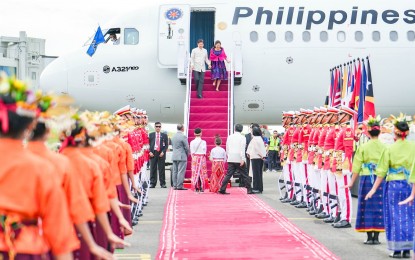
PRIORITY AREAS. President Ferdinand R. Marcos Jr. and First Lady Liza Araneta-Marcos arrive in Labuan Bajo, Indonesia for the 42nd ASEAN Summit and Related Summits on Tuesday (May 9, 2023). In his speech during a plenary session at the Meruorah Komodo Convention Center on Wednesday (May 10), Marcos said upholding international law, promoting trade and investments and addressing climate change must be the top priorities of the Association of Southeast Asian Nations. (Photo from OP FB page)
MANILA – Upholding international law, promoting trade and investments and addressing climate change must be the priorities of the Association of Southeast Asian Nations (ASEAN), President Ferdinand R. Marcos Jr. said on Wednesday.
"In order to harness the potential of our region, I believe that ASEAN must now double its efforts, especially in these following priority areas," Marcos said during the 42nd ASEAN Summit Plenary Session at the Meruorah Komodo Convention Center in Labuan Bajo, Indonesia.
"Against the backdrop of complex geopolitical challenges and macroeconomic fragilities, an ASEAN Community that plays a central role in shaping the evolving regional architecture, an ASEAN Community that is dynamic, innovative and integrated for the global economy, and an ASEAN Community that can realize the full potential for its peoples is the indispensable bedrock for a peaceful, stable, and resilient region," he added.
Marcos called on his fellow ASEAN leaders to uphold international law and the international-rules based system to ensure "peace, security, stability and prosperity of our region."
Marcos said the Philippines, as a staunch advocate of the protection of the rights and welfare of migrants, welcomes Indonesia's ASEAN chairmanship priority of strengthening regional cooperation to address cross-border crimes.
He lauded Indonesia's efforts to intensify the fight against trafficking in persons caused by the misuse of technology, as well as to mainstream the protection of migrant workers and their families in crises.
Promoting trade
Marcos also urged his fellow ASEAN leaders to boost trade and economic cooperation in the region.
"ASEAN should demonstrate its commitment to the principle of free trade and to the multilateral trading system," he said, noting that the Philippines has already deposited its instrument of ratification of the Regional Comprehensive Economic Partnership (RCEP).
RCEP negotiations were formally launched by ASEAN and its six free trade agreement (FTA) partners— Australia, China, India, Japan, South Korea, and New Zealand — in Cambodia in November 2012 and signed in 2020.
The Philippine Senate ratified the deal in February 2023, making the country the last signatory aside from Myanmar to complete the agreement.
The agreement will enter into force in the Philippines on June 2.
Marcos expressed optimism that RCEP will serve as an "engine of growth" that will help build more resilient supply chains and support the integration of our micro, small, and medium enterprises (MSMEs) into the global economy.
'Vibrant digital economy'
Marcos likewise asked his counterparts from the ASEAN to forge a "vibrant digital economy," ensuring that the region is "equipped with the digital skills for the future so that no one is left behind in the midst of our world's digital transformation."
He also pushed for the strengthening of cross-border connectivity and the interoperability of digital frameworks.
He made the call, as he depicted ASEAN as a "hub for global economic growth."
Food, energy security
Marcos also stressed the need to ensure that food and energy systems in the region are "resilient," in the face of the supply and price fluctuations triggered by geopolitical instability and conflict, pandemic, climate change, logistic chain disruptions and fuel shortages.
The Philippines, he said, is stepping up its efforts to attain food security in the country.
"The Philippines aims to strengthen food security and production efficiency via the use of new agricultural technologies, upgrading technical and vocational education and training, and adopting climate- and disaster-resilient technologies," Marcos said.
The President added that his administration would also take "bold" steps to transition to renewable and alternative energy technologies "in a secure and sustainable manner."
"Recognizing that a cleaner energy future is anchored on the supply of critical minerals, ASEAN should now start enhancing regional cooperation towards boosting the region’s strategic industrial metals and minerals value chain," he said.
Addressing climate change
Marcos also called on his fellow ASEAN leaders to take a united stand in urging developed countries to fulfill their long-standing commitments to the Paris Agreement, a legally binding international treaty on climate change.
He lamented that developing nations like the Philippines, which only account for less than 1 percent of global emissions, have to "bear the brunt of the devastating impacts of climate change."
"Developed countries have a moral obligation to support adaptation and mitigation efforts for the most vulnerable countries through technology transfer, capacity-building, and climate financing. This, to address loss and damage and to achieve the necessary breakthroughs for climate action at a global scale," Marcos said.
The Philippines also supports the ASEAN Center for Biodiversity for the conservation and sustainable use of biodiversity.
"The Philippine recognizes that biodiversity can complement and synergize with ASEAN's initiatives in climate change, contributing to our efforts towards a more sustainable and resilient future," he said.
Aside from the Philippines and Indonesia, other members of the Association of Southeast Asian Nations are Brunei, Cambodia, Laos, Malaysia, Myanmar, Singapore, Thailand and Vietnam. (PNA)
